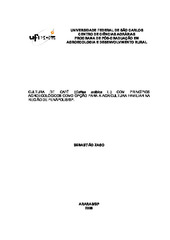| dc.contributor.author | Zago, Sebastião | |
| dc.date.accessioned | 2016-06-02T18:57:20Z | |
| dc.date.available | 2009-09-18 | |
| dc.date.available | 2016-06-02T18:57:20Z | |
| dc.date.issued | 2008-12-08 | |
| dc.identifier.citation | ZAGO, Sebastião. Coffee culture (Coffea arabica L.) with agroecological principles as option for family agriculture in the region of Penápolis / SP. 2008. 214 f. Dissertação (Mestrado em Ciências Agrárias) - Universidade Federal de São Carlos, Araras, 2008. | por |
| dc.identifier.uri | https://repositorio.ufscar.br/handle/ufscar/48 | |
| dc.description.abstract | The county of Penápolis and region, located into the northwest of São Paulo state, was deforested by coffee growing and they became strong producers in the beginning of the past century, influencing on the plan of the railroads on diffusion of the immigrants. But, due to economic factors, climatic and politicians, this culture has been replaced by others activities agriculture, developed for the big properties, such as the sugar cane and the meadow, overwhelming so, the familiar agriculture that if turned out inoperable on
conventional molds of production, causing the removal of the little farmer to the city in search of others fountains of income. The purpose of this work was the following-up the formation and handling of a experimental farming of coffee on agroecologic molds and the definition of the indicators of sustainability for the assessment and comparison of results with others cultivations of conventional principles, organic and a fragment of natural forest, for parameters for analysis, assessment and implementation of this system of cultivation on region. In this work, it concluded that the coffee on agroecologics molds promoted sensitive physical-chemical and biological transformations in the system, indicating that, the use of alternative techniques of production combined with
coffee cultivation tradition and the farmer s capacity it s possible to make the coffee culture as an alternative to family farming in the region. | eng |
| dc.format | application/pdf | por |
| dc.language | por | por |
| dc.publisher | Universidade Federal de São Carlos | por |
| dc.rights | Acesso Aberto | por |
| dc.subject | Colonização | por |
| dc.subject | Café - cultivo | por |
| dc.subject | Agroecologia | por |
| dc.subject | Agricultura familiar | por |
| dc.subject | Sustentabilidade | por |
| dc.subject | Cafeicultura | por |
| dc.subject | Colonization | eng |
| dc.subject | Coffee growing | eng |
| dc.subject | Agroecologic | eng |
| dc.subject | Family agriculture | eng |
| dc.subject | Sustainability | eng |
| dc.title | Cultura de café (Coffea arábica L.) com princípios agroecológicos como opção para a agricultura familiar na
região de Penápolis/SP | por |
| dc.title.alternative | Coffee culture (Coffea arabica L.) with agroecological principles as option for family agriculture in the region of Penápolis / SP | eng |
| dc.type | Dissertação | por |
| dc.contributor.advisor1 | Ferraz, José Maria Gusman | |
| dc.contributor.advisor1Lattes | http://http://lattes.cnpq.br/3851804858390996 | por |
| dc.description.resumo | O município de Penápolis e região, localizados no noroeste do
estado de São Paulo, foram desbravados para implantação da cafeicultura e tornaram-se fortes produtores no início do século passado, influenciando no traçado das ferrovias e na dispersão dos imigrantes. Porém, devido a fatores econômicos, climáticos e políticos, essa cultura foi substituída por outras atividades agropecuárias, desenvolvidas para as grandes propriedades, como a cana-de-açúcar e a pastagem, oprimindo assim, a agricultura familiar que se tornou inviável em moldes convencionais de produção, provocando a retirada
do agricultor familiar para a cidade em busca de outras fontes de renda. O objetivo desse trabalho é o acompanhamento da formação e manejo de uma lavoura experimental de café em moldes agroecológicos e a definição de indicadores de sustentabilidade, para avaliação e comparação de resultados
com outros cultivos de princípios convencionais, orgânico e um fragmento de mata natural, como parâmetros para a análise, avaliação e implementação desse sistema de cultivo na região, em busca de um resgate da tradição local. Neste trabalho, concluiu-se que a cafeicultura em moldes agroecológicos promoveu sensíveis transformações físico-químicas e biológicas no sistema, indicando que, com a utilização de técnicas alternativas de produção aliadas à
tradição do cultivo do café e à aptidão do agricultor, é possível viabilizar a cafeicultura como alternativa para a agricultura familiar na região. | por |
| dc.publisher.country | BR | por |
| dc.publisher.initials | UFSCar | por |
| dc.publisher.program | Programa de Pós-Graduação em Agroecologia e Desenvolvimento Rural - PPGADR-Ar | por |
| dc.subject.cnpq | CIENCIAS AGRARIAS | por |
| dc.contributor.authorlattes | http://lattes.cnpq.br/1288092157014644 | por |
